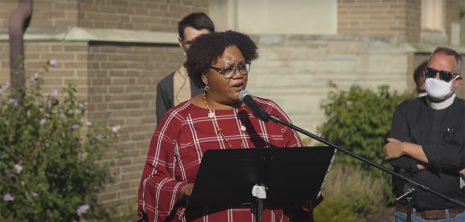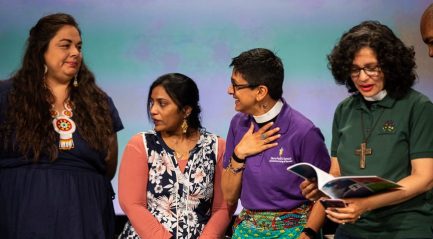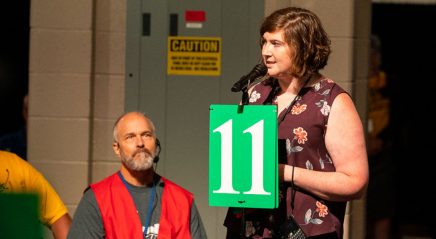In response to the Sept. 23 grand jury decision in the police killing of Breonna Taylor, Elizabeth Eaton, ELCA presiding bishop, and William Gafkjen, bishop of the ELCA Indiana-Kentucky Synod, this week offered a word of prayer and healing.
“We grieve the brokenness of the criminal justice system. We are tired and weary of the violence,” the message read. “Has not God created all of us to have inherent dignity, value and worth?
“Our baptismal covenant with God calls us to better relationship with one another than we are currently demonstrating. We are called to be the hands and feet of Christ’s presence in the world. The covenantal relationship we have with God in Christ leads us to our neighbors in a common cause to confront the reality of systemic racism in our country.”
Judith Roberts, ELCA program director for racial justice ministries, emphasizes the ELCA’s social statement “The Church and Criminal Justice: Hearing the Cries,” which calls for reforms in policies and practices in the criminal justice system.
“The church calls for an accountability of the roles race and class play out within the criminal justice system,” Roberts said. “This must also include a systemic analysis of racism within the criminal justice system and accountability to communities of color in the charges and sentencing related to the extrajudicial use of force and murder enacted upon by law enforcement.”
“First, the criminal justice system must acknowledge the racial disparities, and address the implicit and explicit racism that persists” (“The Church and Criminal Justice,” page 39).
“Through our social statement, this church also calls for reforms of such policies and policing tactics that continue to cause racial and economic injustices in the form of sentencing, brutality, and the extrajudicial killings of black and brown people,” Roberts said.
“Policing decisions about which neighborhoods and types of drugs should be the focus of enforcement efforts only contribute to these disparities” (“The Church and Criminal Justice,” page 39).
Fulfilling our commitments
Andy Rutrough, pastor of St. John Lutheran Church in Louisville, Ky., and convener of the racial justice team in the Indiana-Kentucky Synod, said the team’s work, along with other synod initiatives, “contributes to an atmosphere among ELCA pastors in Louisville and throughout the synod where we can wrestle with issues of racism with honesty.”
Rutrough said this atmosphere has led several pastors and members to attend protests in Louisville and to collaborate with protesters in other locations around the country. He acknowledged that not everyone in the synod holds the same views on issues of racial justice but that the work carries on.
“We can walk the journey of the cross together,” he said. “We can engage these issues with a focus, not on self-justification or self-benefit, but on the well-being of others and, especially, the well-being of people who have less money, less power, less respect, less population in society, but more particular concern in the eyes of God than we do.”
Lamont Anthony Wells, president of the African Descent Lutheran Association (ADLA) and program director for the Lutheran Campus Ministry Network, said, “Members and leaders within the [association] have lamented this grand jury decision as a stark and gross injustice against the humanity of Breonna Taylor.”
After hearing the explanation of the grand jury decision from the Kentucky attorney general, Wells and other ADLA leaders traveled to Louisville to be a “ministry of presence and support for the outraged community in the downtown streets,” he said.
ADLA leaders traveled to Louisville to be a “ministry of presence and support for the outraged community in the downtown streets.”
“We were there to be accomplices in this freedom movement inspired by the gospel of Jesus Christ, which is power unto salvation,” he added. “Bishops Eaton and Gafkjen are right in [saying,] ‘because of the cross, we have peace; we have hope; we are loved,’ and ADLA adds that we are organizing ourselves along with local communities to dismantle systemic racism and its powers.”
Wells said ADLA planned to “boldly engage our church” in fulfilling the commitments made in the “Declaration to the ELCA to People of African Descent,” adopted by the ELCA Church Council and presented to the 2019 ELCA Churchwide Assembly, and the “African Descent Lutheran Lives Matter” resolution adopted by the 2016 Churchwide Assembly, as well as in social statements and messages.
“We continue to speak her name: Breonna Taylor. Hearing her name is hearing her cries for justice,” said Albert Starr, ELCA program director for ethnic specific and multicultural ministries.
“Breonna Taylor was killed in her own home. Instead of protecting her, our legal system precipitated the circumstances that led to her death, yet it can’t seem to find the courage of accountability, valuing her life and granting her justice.”
Reflecting on the passage from “The Church and Criminal Justice” that reads, “Bearing the cross inevitably moves Christians toward actual identification with the victim” (page 31), Starr said, “We are called to leave the safe and familiar behind to stand with the victim, counting her experience as our own.”









